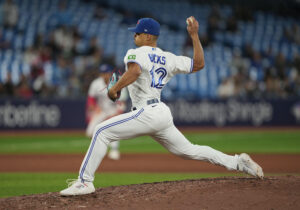Aside from an early flurry by the Braves, there hasn’t been much movement on the relief market. As shown on MLBTR’s contract tracker, seven relievers have signed a deal that guarantees more than $10MM since the end of the regular season. Atlanta inked three of those contracts, two of which (for Pierce Johnson and Joe Jiménez) came just before the opening of free agency.
There’s no question who tops the class; that’s Josh Hader. The #2 reliever is a matter of debate. One could’ve made arguments for Jiménez, Reynaldo López or even NPB closer Yuki Matsui (who signed a five-year, $28MM pact with San Diego). On our Top 50 free agents, we slotted Jordan Hicks and Robert Stephenson as the top bullpen arms behind Hader. We predicted four-year pacts for both players, pegging Hicks for a $40MM deal and Stephenson at $36MM.
Neither pitcher has a multi-year track record of consistency. Yet they’re each hitting the market at an opportune time, coming off strong platform showings that demonstrate significant upside.
Hicks throws as hard as anyone in the game. His sinker averaged a little above 100 MPH, reaching 103-104. The velocity hasn’t translated into quite as many whiffs as it might seem, as the downhill action on the pitch works better as a ground-ball offering.
The righty has kept the ball on the ground on three-fifths of batted balls over the course of his career. His 24.5% career strikeout rate is more solid than exceptional, although he fanned a personal-high 28.4% of opponents last season. In addition to his eye-popping velocity and huge ground-ball numbers, Hicks has age on his side. He turned 27 in September, making him the youngest free agent reliever of note.

The primary concerns with Hicks are his control and injury history. He has never thrown strikes at a league average rate, walking over 10% of opponents in every season (including an 11.2% clip last year). While Hicks turned in a fully healthy platform year with the Cardinals and Blue Jays in 2023, he missed significant time between 2019-22. Much of that was a result of Tommy John surgery in June 2019. He lost a good portion of the ’21 campaign to continued elbow inflammation, while a flexor strain in his forearm cost him a chunk of the ’22 season.
Stephenson, who turns 31 in February, hasn’t had the same level of alarming arm issues. His career performance track record is spottier, though, as he has allowed 4.64 earned runs per nine over 364 1/3 frames. Some of that is a reflection of pitching in hitter-friendly parks in Cincinnati and Colorado, but Stephenson also posted unspectacular results in 28 1/3 innings with the Pirates.
As recently as last summer, he seemed a fairly nondescript pitcher. He’d been a highly-regarded prospect and showed intriguing stuff without much success at the MLB level. Things turned following an early June trade to the Rays.
In 38 1/3 frames with Tampa Bay, Stephenson posted a 2.35 ERA while striking out 42.9% of opponents. He missed bats on an astounding 28.7% of his offerings. That was not only the highest rate in MLB over that stretch, it was nearly eight percentage points above second-place Félix Bautista. Over the season’s final four months, he was handily the most dominant reliever in the majors on a pitch-for-pitch basis.

Stephenson doesn’t have the triple-digit velocity of Hicks. Averaging 97 MPH on the heater is more than sufficient, though. He introduced an upper-80s cutter in Tampa Bay, against which hitters made contact on only 40% of their swings. Stephenson has the decided edge in swing-and-miss potential. The question is how much of his dominant four months in Tampa Bay is replicable. He’s unlikely to continue missing bats at that exceptional clip — no pitcher should be expected to maintain that kind of pace — but he’s markedly better than the hurler who owned a career 4.91 ERA and 24.3% strikeout rate before the trade.
There has been some overlap in the Hicks and Stephenson markets. That’s sensible considering they’re probably the top remaining options for teams that don’t want to meet Hader’s asking price. The Rangers, Yankees, Astros, Angels and Orioles are among the clubs linked to both pitchers this winter (although Baltimore subsequently signed Craig Kimbrel). The Red Sox and Cardinals have been tied to Hicks, while the Cubs and Dodgers were linked to Stephenson early in the offseason.
Which one should teams prioritize? Lean in favor of Hicks’ youth and velocity or Stephenson’s bat-missing potential?
Images courtesy of USA Today Sports.
https://www.mlbtraderumors.com/2023/12/free-agent-faceoff-jordan-hicks-robert-stephenson.html
 Backyard GrillingWeekend WarriorsAdvice from DadBeard GroomingTV Shows for Guys4x4 Off-Road CarsMens FashionSports NewsAncient Archeology World NewsPrivacy PolicyTerms And Conditions
Backyard GrillingWeekend WarriorsAdvice from DadBeard GroomingTV Shows for Guys4x4 Off-Road CarsMens FashionSports NewsAncient Archeology World NewsPrivacy PolicyTerms And Conditions
